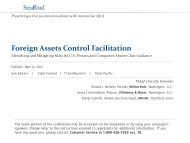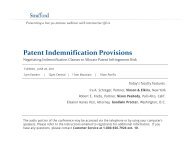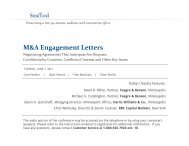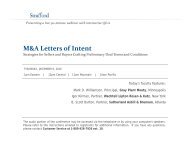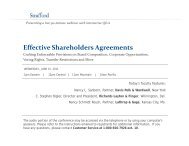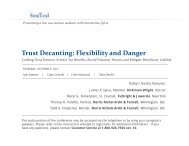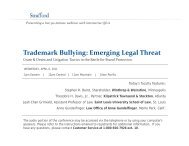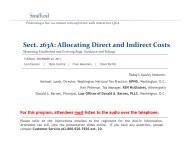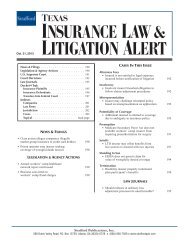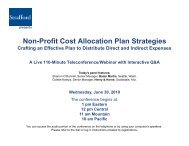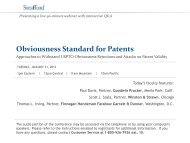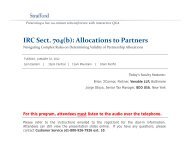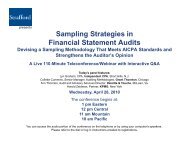FCPA Compliance: Third-Party Due Diligence - Strafford
FCPA Compliance: Third-Party Due Diligence - Strafford
FCPA Compliance: Third-Party Due Diligence - Strafford
Create successful ePaper yourself
Turn your PDF publications into a flip-book with our unique Google optimized e-Paper software.
presents<br />
<strong>FCPA</strong> <strong>Compliance</strong>: <strong>Third</strong>-<strong>Party</strong> <strong>Due</strong> <strong>Diligence</strong><br />
Minimizing Corruption Risks When Using Foreign Agents,<br />
Distributors and Other Intermediaries<br />
A Live 90-Minute Teleconference/Webinar with Interactive Q&A<br />
Today's panel features:<br />
F. Joseph Warin, Partner, Gibson Dunn & Crutcher, Washington, D.C.<br />
Tara Flanagan, Director, Global Public Sector <strong>Compliance</strong>, Cisco Systems, Inc., Herndon, Va.<br />
Edward J. Fishman, Partner, K&L Gates, Washington, D.C.<br />
Thursday, August 5, 2010<br />
The conference begins at:<br />
1 pm Eastern<br />
12 pm Central<br />
11 am Mountain<br />
10 am Pacific<br />
You can access the audio portion of the conference on the telephone or by using your computer's speakers.<br />
Please refer to the dial in/ log in instructions emailed to registrations.
For CLE purposes, please let us know<br />
how many people are listening at your<br />
location by<br />
• closing the notification box<br />
• and typing in the chat box your<br />
company name and the number of<br />
attendees.<br />
• Then click the blue icon beside the box<br />
to send.<br />
For live event only.
• If you are listening via your computer<br />
speakers, please note that the quality of your<br />
sound will vary depending on the speed and<br />
quality of your internet t connection.<br />
• If the sound quality is not satisfactory and you<br />
are listening i via your computer speakers,<br />
please dial 1-866-871-8924 and enter your<br />
PIN when prompted. p Otherwise, please send<br />
us a chat or e-mail sound@straffordpub.com<br />
immediately so we can address the problem.<br />
• If you dialed in and have any difficulties<br />
during the call, press *0 for assistance.
<strong>FCPA</strong> <strong>Compliance</strong>: <strong>Third</strong> <strong>Party</strong> <strong>Due</strong> <strong>Diligence</strong><br />
Minimizing Corruption Risks When Using<br />
Foreign Agents, Distributors and Other<br />
Intermediaries<br />
F. Joseph Warin and Michael S. Diamant, Gibson, Dunn & Crutcher LLP<br />
August 5, 2010
A Brief Overview of the <strong>FCPA</strong><br />
The Foreign Corrupt Practices Act was enacted in<br />
1977 in the wake of reports that numerous U.S.<br />
businesses were making large payments to foreign<br />
officials to secure business.<br />
• Anti-Bribery Provisions: The <strong>FCPA</strong> prohibits giving or offering anything<br />
of value to a foreign government official, political party, or party official<br />
with the intent to influence that official in his or her official capacity or to<br />
secure an improper advantage in order to obtain or retain business.<br />
• Accounting Provisions: The <strong>FCPA</strong> also requires publicly traded U.S.<br />
companies to maintain accurate “books and records” and reasonably<br />
effective internal controls.<br />
5
Scope of the <strong>FCPA</strong>: Who Is Covered<br />
• Issuers: any company whose securities (including ADRs and registered<br />
debt) are registered in the United States or that is required to file periodic<br />
reports with the SEC<br />
• Domestic Concerns: any individual who is a U.S. citizen, national, or<br />
resident of the United States (not just U.S. citizens), or any business<br />
organization that has its principal place of business in the United States or<br />
which is organized in the United States<br />
• Other Persons who take any act in furtherance of a corrupt payment while<br />
within the territory of the United States<br />
6
Definition of Foreign Official<br />
The <strong>FCPA</strong> prohibits corrupt payments to “foreign officials,” which has been<br />
expansively defined to include:<br />
• Any officer or employee (including low-level<br />
employees and officials) of a foreign government or<br />
any department, agency, or instrumentality of the<br />
government, including government-owned or<br />
government-controlled businesses and enterprises.<br />
• Officers and employees of public international<br />
organizations, including the United Nations, World<br />
Bank, and others.<br />
The <strong>FCPA</strong> also prohibits corrupt payments to foreign<br />
political parties, officials of foreign political parties,<br />
and candidates for foreign political office.<br />
7
A “Thing of Value”<br />
Liability exists from the first dollar—there is no “de minimis” exception. It is<br />
not limited i to tangible items of economic value and can include:<br />
• Gifts<br />
• Entertainment<br />
• Internships<br />
• Professional training<br />
• Education<br />
• Trips<br />
• Loans<br />
• Employment<br />
• Meals<br />
• Travel assistance<br />
8
<strong>Third</strong> <strong>Party</strong> Liability: Indirect Payments (and Offers) Are<br />
Prohibited<br />
The <strong>FCPA</strong> prohibits indirect corrupt payments as well and imposes liability if<br />
the U.S. company authorizes a payment to a third party while “knowing” that<br />
the third party will make a corrupt payment.<br />
– <strong>Third</strong> parties include local agents, consultants, attorneys, subsidiaries,<br />
freight forwarders, etc.<br />
– “Knowledge” means either<br />
1. bi being aware of such conduct or substantially ill certain that such<br />
conduct will occur, or<br />
2. consciously disregarding a “high probability” that a corrupt<br />
payment or offer will be made.<br />
9
A Brief Overview of the UK Bribery Act<br />
• The Bribery Act criminalizes bribery by UK incorporated companies, as<br />
well as non-UK companies that do business in the United Kingdom.<br />
• The Bribery Act cleared the final stages of the Parliamentary process on<br />
April 8, 2010, and is expected to come into force in April 2011.<br />
• The Bribery Act creates four separate<br />
offenses:<br />
1. Bribing,<br />
2. Being bribed,<br />
3. Bribing a foreign public official, and<br />
4. Failing to prevent bribery (applicable to<br />
corporate entities only).<br />
10
Failing to Prevent Bribery and the “Adequate Procedures”<br />
Defense<br />
The Act also creates the offense of failing to prevent bribery. An entity<br />
may be held liable for bribery y(public or private) committed for the benefit<br />
of the entity by:<br />
• an employee, agent, distributor, intermediary, subsidiary, etc.<br />
An entity charged with violating this provision has a defense if it can<br />
prove:<br />
• it had “adequate procedures” in place that were designed to prevent bribery.<br />
The U.K. Government is expected to issue guidance on what constitutes “adequate<br />
procedures” in early 2011.<br />
11
Recent <strong>Third</strong> <strong>Party</strong> Enforcement Cases: Frederic<br />
Bourke<br />
On July 20, 2009, a jury in New York federal court convicted Frederic Bourke of<br />
conspiracy to violate the <strong>FCPA</strong> in connection with his $8 million investment in a failed<br />
business concerning the privatization of the government-controlled petroleum industry in<br />
Azerbaijan. On November 10, 2009, Judge Shira Scheindlin sentenced Bourke to one<br />
year and one day in prison and ordered him to pay a $1 million fine.<br />
• Bourke was not accused of bribery or directing others to commit<br />
bribery; rather, he was charged with conspiring i to violate the <strong>FCPA</strong><br />
by investing in an entity that he knew or had every reason to know<br />
was engaged in a scheme to bribe Azeri officials.<br />
• When instructing the jury on “knowledge,” Judge Scheindlin<br />
provided a so-called “ostrich” instruction: “Knowledge may be<br />
established if a person is aware of a high probability [that corrupt<br />
payments are being offered or made, but] consciously and<br />
intentionally avoided confirming that fact . . . because he wanted to<br />
be able to deny knowledge. . . . [However,] knowledge is not<br />
established . . . if the person merely failed to learn the fact through<br />
negligence.”<br />
• Key lesson is that parties operating and investing in countries with<br />
a high h risk of corruption must undertake due diligence and<br />
implement controls to make good faith and reasonable efforts that<br />
funds are not used to make improper payments to government<br />
officials.<br />
12
Recent <strong>Third</strong> <strong>Party</strong> Enforcement Cases: BAE Systems<br />
On March 1, 2010, BAE pleaded guilty to participating in a criminal conspiracy<br />
to impair and impede the lawful functions of the U.S. government by making<br />
false statements concerning its <strong>FCPA</strong> compliance program and payments to third<br />
party consultants in connection with suspected bribes to government officials in<br />
the Czech Republic, Hungary, and Saudi Arabia.<br />
• According to the charging documents, from the mid-1980s through 2002, BAE<br />
regularly retained “marketing advisors” to assist the company in securing sales to<br />
foreign governments. BAE allegedly made substantial payments to these third<br />
parties with very little scrutiny as to their purpose and end use, while taking steps<br />
to conceal the payments by routing them “through various offshore shell entities<br />
beneficially owned by BAE[].”<br />
• BAE agreed to pay a $400 million criminal fine. At twice the alleged gain from<br />
the offense of $200 million, this fine represents the statutory maximum and the<br />
third-largest disposition in the history of <strong>FCPA</strong> enforcement.<br />
13
Recent <strong>Third</strong> <strong>Party</strong> Enforcement Cases: Daimler AG<br />
On April 1, 2010, German automaker Daimler AG and three of its subsidiaries<br />
resolved civil and criminal <strong>FCPA</strong> charges arising from the companies’ alleged<br />
payments to government officials in a number of different countries.<br />
• According to court documents, over a ten-year period, Daimler and its<br />
subsidiaries allegedly funneled improper payments through internal “third-party<br />
accounts,” which were on the companies’ books, but controlled by third parties,<br />
subsidiaries, and affiliates. These accounts were allegedly used for the payments<br />
because they were not subject to regular audits or the companies’ other standard<br />
financial controls.<br />
• To resolve the charges, Daimler AG and its subsidiaries agreed to pay a collective<br />
criminal fine of $93.6 million, in addition to Daimler’s agreement to disgorge<br />
$91.4 million in allegedly ill-gotten gains in connection with settling a related<br />
SEC complaint alleging violations of the anti-bribery, books-and-records, and<br />
internal controls provisions.<br />
14
Unique Risks Created by Different <strong>Third</strong> Parties<br />
• Sales and marketing agents<br />
• Distributors/resellers<br />
• Freight forwarders/logistics companies<br />
• Other consultants<br />
15
Risks Involving Agents<br />
Many corporations have been prosecuted for making improper payments<br />
through agents retained to pass along those payments to government officials.<br />
• Datron Systems Inc. - From 1999 through 2003, an agent<br />
for Datron Systems Inc., a subsidiary of Titan Corp.,<br />
allegedly made payments to Filipino military officials to<br />
obtain business for Datron and Titan. To resolve this and<br />
other <strong>FCPA</strong> violations, Titan pleaded guilty to criminal<br />
<strong>FCPA</strong> charges and settled related civil charges, agreeing to<br />
pay a total of $28.5 million, including a $13 million<br />
criminal penalty and $15.5 5 million in disgorgement and<br />
prejudgment interest.<br />
• Paradigm BV - Paradigm’s Chinese subsidiary was<br />
alleged to have used an agent to make payments to<br />
representatives ti of a subsidiary of the Chinese National<br />
Offshore Oil Company.<br />
• Faro Technologies: - Although Faro’s Chinese subsidiary made payments directly to<br />
Chinese officials in 2004 and 2005, in 2005 it allegedly decided to route the payments<br />
through an agent to “avoid exposure.” In its 2008 settlement with the SEC, Faro paid<br />
approximately $2.95 million in total penalties.<br />
16
Risks Involving Agents (cont.)<br />
• UTStarcom, Inc. - On December 31, 2009, UTStarcom, Inc., a California-based<br />
telecommunications company, settled <strong>FCPA</strong> charges arising from the company’s<br />
operations in China, Mongolia, and Thailand. The government alleged that,<br />
between 2001 and 2007, UTStarcom paid $1.5 million to the company’s agent in<br />
Mongolia, claiming that it was for a “license fee,” when, in fact, the actual license<br />
fee was only $50,000 and the balance was used to make improper payments to a<br />
government official.<br />
• United Industrial Corp. - On May 29, 2009, United Industrial Corp., a Maryland-<br />
based aerospace and defense systems contractor, settled administrative charges<br />
with the SEC and agreed to pay $337,679.42 in disgorgement and prejudgment<br />
interest and a $35,000 civil penalty. The SEC claimed that, in 2001 and 2002,<br />
UIC subsidiary ACL Technologies, Inc. made more than $100,000 in payments to<br />
a third party agent with the expectation that the agent would pass portions of<br />
those payments to Egyptian Air Force officials to influence the award of a<br />
contract to construct and staff a military aircraft depot in Cairo.<br />
17
Risks Involving Distributors/Resellers<br />
Corporations have been prosecuted for improper payments made by distributors under the<br />
theory that the corporation was “aware of a high probability that the distributor intended<br />
to fund [the improper payments] out of the difference between the price the distributor<br />
paid [the corporation] to acquire [its products] and the price for which the distributor was<br />
able to resell them.” – SEC v. InVision Technologies, Inc., Compl. 17 (filed Feb. 14, 2005)<br />
• InVision Technologies, Inc. – InVisison Technologies, Inc.’s third party distributors<br />
allegedly made payments to foreign officials to induce them to buy InVision’s baggage<br />
screening machines. InVision agreed to pay $1.8 million in total penalties as part of its<br />
settlement in 2004.<br />
• AGA Medical Corp. – In June 2008, AGA Medical Corp. agreed to pay a $2 million<br />
penalty based on $460,000 in alleged payments to physicians at state-owned hospitals<br />
through AGA’s Chinese distributor.<br />
• Avery Dennison Corp. – In July 2009, the SEC complaint against Avery Dennison<br />
Corp. alleged that the company’s Chinese subsidiary engaged in a kickback scheme<br />
with a distributor. Rather than pay the money directly to the project manager for a<br />
state-owned enterprise, a sales manager sold the product to a distributor, which, in turn,<br />
paid the kickback to the project manager out of its profit margin.<br />
18
Risks Involving Distributors/Resellers (cont.)<br />
• Fiat S.p.A. – The DOJ and the SEC alleged that after multiple Fiat entities entered<br />
into several direct contracts with the Government of Iraq in which their agents made<br />
improper payments on their behalf, the subsidiaries i decided d to distance themselves<br />
from future payments by turning their agents into distributors. The subsidiaries<br />
allegedly did so with full knowledge that their distributors would resell the goods to<br />
the Iraqi government and make the improper payments in connection with these<br />
sales. The subsidiaries then offered their agents-turned-distributors 20% discounts --<br />
10% for the improper payments and 10% for the distributor’s profits when it resold<br />
the products to the Iraqi government.<br />
• Ingersoll-Rand dCo. Ltd. - In another Oil-for-Food case similar il to Fiat, the DOJ and<br />
the SEC alleged that the Ingersoll-Rand subsidiaries granted a 65% discount to their<br />
distributors -- 10% more than their standard 55% distributor discount -- in order to<br />
cover the distributors’ obligations to make improper p payments to the Iraqi<br />
government.<br />
• AB Volvo – In a third Oil-for-Food case, it was alleged that AB Volvo’s subsidiaries<br />
sold their products at a price that ensured the distributors would have enough<br />
“spread” to make the improper payments even though hthere was no discount afforded<br />
d<br />
the distributors explicitly for the improper payments.<br />
19
Risks Involving Freight Forwarders/Logistics<br />
Corporations<br />
Companies<br />
are being prosecuted for improper payments allegedly made<br />
through freight forwarding and logistics companies.<br />
• On July 2, 2007, the DOJ sent letters to eleven oil and oil-service<br />
companies asking them to detail their relationship with Panalpina<br />
Welttransport Holding AG.<br />
• The firms were asked to list the countries where Panalpina<br />
provided them with services in the past five years and specify<br />
what they paid for those services.<br />
• Each firm was asked to meet separately with federal prosecutors<br />
in Washington, D.C.<br />
• In April 2010, Panalpina announced that it had reserved<br />
approximately $110 million for an expected <strong>FCPA</strong> settlement “in<br />
the near future. ” Also, several of the oil and oil-service<br />
companies have announced that they have set aside millions of<br />
dollars for anticipated <strong>FCPA</strong> settlements with the DOJ and SEC.<br />
20
Risks Involving Consultants<br />
Several corporations have been prosecuted for improper payments or benefits<br />
allegedly made by consultants to government officials in order to secure sales.<br />
• BAE Systems - According to the charging documents, from the mid-1980s through 2002,<br />
BAE regularly retained “marketing advisors” to assist the company in securing sales to<br />
foreign governments. BAE allegedly made substantial payments to these third parties with<br />
very little scrutiny as to their purpose and end use, while taking steps to conceal the payments<br />
by routing them “through various offshore shell entities beneficially owned by BAE[].”<br />
• Siemens AG - Siemens’ transportation systems division allegedly paid approximately y$ $22<br />
million to “business consultants” who used some portion of the funds to make payments to<br />
foreign officials in China in connection with seven projects for the construction of metro<br />
trains and signaling devices.<br />
• Control Components Inc. - CCI allegedly made improper payments, sometimes directly and<br />
sometimes through its representative or “consultants” retained who performed no legitimate<br />
services for CCI.<br />
21
Risks Involving Consultants (cont.)<br />
• Haiti Teleco Prosecution - DOJ filed a number of cases in 2009<br />
arising from its investigation of several Florida-based<br />
telecommunications companies and their allegedly corrupt<br />
arrangements with officials of Telecommunications D’Haiti, Haiti’s<br />
state-owned telecommunications company. In all, eight people<br />
have now been charged, including three third-party consultants used<br />
as intermediaries to make the alleged payments.<br />
• Veraz Networks, Inc. - On June 29, 2010, the SEC filed a settled civil action<br />
charging Veraz Networks, Inc., a California-based telecommunications firm, with<br />
violating the <strong>FCPA</strong>’s books-and-records d and internal controls provisions i in<br />
connection with sales in China and Vietnam. In China, a third-party consultant of<br />
Veraz allegedly provided approximately $4,500 in gifts to officials of a statecontrolled<br />
telecommunications company in what one Veraz employee purportedly<br />
referred to as a “gift scheme.” The consultant t also allegedly offered to pay a<br />
$35,000 bribe to officials at this same state company but Veraz discovered the<br />
improper offer before the transaction was completed and cancelled the<br />
sale. Without admitting or denying the allegations, Veraz agreed to pay a $300,000<br />
civil iilpenalty.<br />
22
Use of Agents – Specific “Red Flags”<br />
• Reputations for improper payments or lax anti-money laundering controls<br />
• Pitches near contract award dates<br />
• Explanations of special relationships with government officials<br />
• Insistence of payment in advance of contract award<br />
• Off-shore accounts<br />
• Requests that a commission be paid to or through a third party,<br />
in a different name, or in a different currency or country<br />
• Unusually large commissions<br />
• Unexpected access to usually unavailable information<br />
• Lack of relevant experience in the business<br />
• Lack of staff to do technical work<br />
• Residence outside the relevant country<br />
• Refusals to sign agreements indicating compliance with the <strong>FCPA</strong><br />
• Refusal to agree to audit rights<br />
• Owned by or familial relationships to government officials<br />
• Recommended by government officials<br />
23
Tara Flanagan<br />
Director, Global Public Sector <strong>Compliance</strong><br />
Cisco Systems, Inc.<br />
24
Process should be designed to offer an efficient,<br />
meaningful review of identified business partners<br />
on a defined and periodic basis so that your<br />
organization can make intelligent/informed<br />
decisions about the business partners and take<br />
other actions to mitigate against potential risks<br />
associated with doing business with the partners.<br />
Process should be documented<br />
(policy/guidelines/other communications),<br />
transparent, and communicated to partners as well<br />
as to your employees who engage with the<br />
partners.<br />
25
Who are they<br />
What are they to do/doing for your organization<br />
Where are they located<br />
What kind of contracts currently exist<br />
Do existing contracts include appropriate anti-bribery<br />
terms<br />
Can you assess/categorize by risk<br />
Transparency International CP Index:<br />
http://www.transparency.org/policy_research/surveys_indi<br />
ces/cpi/2009<br />
The emergence of other risk-based scoring systems by<br />
third party due diligence service providers<br />
26
Resellers<br />
Distributors<br />
Sales agents<br />
Consultants<br />
Attorneys<br />
Joint Venture<br />
Partners<br />
Investment Partners<br />
Prospective<br />
acquisitions<br />
Customs<br />
Brokers/Agents<br />
Marketing Agents<br />
Vendors/suppliers/oth<br />
er third parties who<br />
interact with<br />
government-affiliated<br />
organizations<br />
27
Do you have internal support/buy in by the<br />
business<br />
Plan for the long term.<br />
Who will “own” this process<br />
Who are key internal stakeholders<br />
What kind of budget/staffing resources are<br />
available<br />
Can you leverage existing<br />
systems/tools/processes<br />
28
Evaluate/Establish a Workable<br />
Process Flow<br />
Chart out your process flow (beginning to end)<br />
• Typical Key Steps For a Partner Under Review:<br />
Completion of a Questionnaire, Certifications<br />
Anti-bribery training, providing any follow up<br />
information, agreement to anti-bribery contract terms<br />
• Typical Key Internal Company Steps:<br />
Collection of data/information/due diligence report<br />
Review/decisions by key stakeholders<br />
Final Disposition/documentation:<br />
Retention/contracting process or termination of the<br />
partner<br />
29
What is your process for addressing any<br />
identified red flags<br />
Do you have a clear escalation/decision-<br />
making path<br />
Where and how do you retain/store your<br />
due diligence findings<br />
How do you document your final<br />
resolution/dispositions<br />
Do you have a document retention policy<br />
for your due diligence-related<br />
reports/work<br />
30
Multiple languages for<br />
questionnaire and training<br />
Using web-based tools<br />
Recognize that you may need to<br />
have different levels of review for<br />
different partners<br />
Process should be consistent<br />
Develop a communication plan<br />
about the process to increase<br />
understanding and awareness for<br />
both internal personnel as well as<br />
your business partners<br />
<br />
<br />
<br />
<br />
Design your process to be as<br />
simple as possible<br />
Be prepared to constantly reevaluate<br />
your process in light of<br />
changing business activities and<br />
laws<br />
Stay on top of industry best<br />
practices-trend toward<br />
development of a wider range of<br />
commercially available<br />
tools/processes<br />
Ongoing training for your due<br />
diligence team<br />
31
A history of corruption in a country<br />
Any family relationship between business<br />
partner principals/employees and<br />
government officials<br />
Any unusual means of payment<br />
The size of the commission paid to the agent<br />
in relation to the services performed<br />
Apparent lack of qualifications on the part of<br />
the agent to perform services<br />
33
Refusal by business partner to sign affidavits<br />
or make representations that they will not<br />
violate <strong>FCPA</strong><br />
Any misrepresentations in connection with<br />
proposed transaction or in due diligence<br />
process<br />
Requests for false or incomplete<br />
documentation<br />
Lack of transparency in financial records<br />
Disclosure of extensive gift-giving i i or<br />
entertainment practices<br />
34
“Please Pay Me In Cash”<br />
“Pay Me Through h My Swiss [Or Offshore] Bank Account”<br />
“My Close Relative Is A Government Official, and You<br />
Don’t Have A Chance To Win the Contract Unless You<br />
Hire Me”<br />
“I Have No Facilities or Staff, But I’ll Get the Job Done”<br />
“I Have Never Worked In Your Industry Before, But I<br />
Know The Right People”<br />
“While My Commission Rate is Twice The Market Rate,<br />
I’m Well Worth It Because of My Connections”<br />
35
BEST PRACTICES FOR ANTI-<br />
CORRUPTION DUE DILIGENCE<br />
ON THIRD PARTIES<br />
Prepared for:<br />
<strong>Strafford</strong> CLE Webinar/Teleconference<br />
<strong>FCPA</strong> <strong>Compliance</strong>: <strong>Third</strong>-<strong>Party</strong> <strong>Due</strong> <strong>Diligence</strong><br />
August 5, 2010<br />
©2009 K&L GATES LLP<br />
All Rights Reserved<br />
Ed Fishman<br />
K&L GATES LLP<br />
1601 K Street, NW<br />
Washington, DC 20006-1600<br />
(202) 778-9456<br />
ed.fishman@klgates.com<br />
36
Overview of Presentation Topics<br />
• Review “Best Practices” for <strong>Third</strong> <strong>Party</strong> <strong>Diligence</strong><br />
and Cost Effective Strategies for Conducting<br />
<strong>Diligence</strong> in a Global Business<br />
• Discuss Practical Challenges of Implementing <strong>Third</strong><br />
<strong>Party</strong> <strong>FCPA</strong> <strong>Diligence</strong> Program<br />
• Identify Unique Issues Raised By <strong>Third</strong> <strong>Party</strong> <strong>FCPA</strong><br />
<strong>Diligence</strong> In M&A Context<br />
37
<strong>Third</strong> <strong>Party</strong> <strong>FCPA</strong> <strong>Due</strong> <strong>Diligence</strong> Fundamentals<br />
Four Core Elements:<br />
• Background Evaluation/Risk Assessment<br />
• Questionnaire Response/Interview/Documentation<br />
• Reps and Warranties/Certification/Training<br />
• Investigation of Potential Problems and Remediation<br />
38
<strong>FCPA</strong> <strong>Third</strong> <strong>Party</strong> <strong>Due</strong> <strong>Diligence</strong> Goals<br />
• Determine the Competence, Expertise, Reputation and<br />
Integrity of the <strong>Third</strong> <strong>Party</strong> Agent<br />
• Determine <strong>Third</strong> <strong>Party</strong>’s Relations With Government Officials i through Business, Family, Employment or Political Activity<br />
• Caution: Carefully Scrutinize “Success Fees” and<br />
Gift/Entertainment Practices<br />
• Sources of Inquiry: Commercial Services, Risk Management<br />
Firms, U.S. Embassy/Commerce Service ICP Reports,<br />
Private Investigators, and Local Legal Opinions<br />
39
<strong>Third</strong> <strong>Party</strong> <strong>FCPA</strong> <strong>Diligence</strong> “Best Practices”<br />
• Step 1: Identify Universe of <strong>Third</strong> <strong>Party</strong> Agents<br />
• Internal Inventory Process (“Know Your Agents”)<br />
• Separate into Relevant Categories<br />
• Sales and Marketing Reps/Commercial Agents<br />
• Distributors, tors Resellers and <strong>Third</strong> <strong>Party</strong> Purchasers<br />
• Consultants (Tax, Customs Brokers, Freight Forwarders)<br />
• Suppliers/Vendors/Other Service Providers<br />
• Identify Those Likely to Interact with “Government<br />
Officials” as defined under Anti-Corruption Laws<br />
40
<strong>Third</strong> <strong>Party</strong> <strong>Diligence</strong> “Best Practices”<br />
• Step 2: Design <strong>Diligence</strong> Program Based on Risk<br />
• Select Reasonable Method of Assessing Risk<br />
• Category of <strong>Third</strong> <strong>Party</strong> Agent<br />
• Likelihood of Interactions with “Government Officials”<br />
• Local Corruption Risk and Other “Red Flags”<br />
• Use Objective Risk Evaluation Scoring Methodology<br />
• Create Standard Written Policy for Different<br />
Categories of <strong>Third</strong> Parties<br />
• Separate Policy for Commercial Agents, Consultants and<br />
Other Types of Intermediaries<br />
• Different Levels of Review/Approval within Same Policy<br />
41
<strong>Third</strong> <strong>Party</strong> <strong>Diligence</strong> “Best Practices”<br />
• Step 3: Implement and Enforce Policy<br />
• Establish reasonably achievable controls and clear<br />
guidelines/enforcement mechanisms<br />
• Ensure support from business leaders<br />
• Anticipate i t varying levels l of compliance and develop<br />
responsive strategies in advance<br />
• Maintain some degree of objectivity in the process<br />
(e.g., independent “agent review committee”)<br />
42
Common Practical Challenges<br />
• Internal Resource and Priority Considerations<br />
• Start with Highest Risk Categories if Necessary<br />
• Identify <strong>Third</strong> <strong>Party</strong> Commercial Agents and Government<br />
Business Consultants in Highest-Risk Countries<br />
• Work Backwards Through Inventory of Agents<br />
• Seek Automated Solutions Without Compromising<br />
Effectiveness of <strong>Diligence</strong> Process<br />
• Ensure Management Understands <strong>Third</strong> <strong>Party</strong> Risks<br />
43
Common Practical Challenges<br />
• Varying Levels of Responsiveness from Agents<br />
• Internal and External Education Process<br />
• Why should I have to worry about US law<br />
• Global Convergence Should Help<br />
• Expect To Deal With Difficult Intermediaries<br />
• Refusal to Submit Information/Complete Questionnaire<br />
• Refusal to Participate in Interview<br />
• Refusal to Sign Certification/Agree to Reps and Warranties<br />
• Resistance Not Always a “Red Flag”<br />
• Some Agents Will Sign Anything (But Risks Remain)<br />
• Some Agents Are More Careful About Foreign Laws<br />
• Challenge is Finding Right Balance<br />
44
Common Practical Challenges<br />
• Potential Solutions to Agent Resistance<br />
• Business relationship manager involvement<br />
• Continue to educate throughout the process<br />
• Search for alternative solutions<br />
• Confidentiality Concerns: Non-Disclosure Agreement<br />
• Outside Counsel/Independent <strong>Third</strong> <strong>Party</strong> Review<br />
• Negotiated Certification/Reps and Warranties<br />
• Legitimate Threat of Termination<br />
• Heightened Monitoring/Oversight Conditions<br />
• Avoid temptation to back down if Red Flags persist<br />
45
Unique Issues Raised in M&A <strong>Diligence</strong><br />
• Issue: Buyer needs to ensure itself that Target’s agent<br />
relationships do not pose unacceptable risk<br />
• Challenge: Target may be unwilling or unable to provide full<br />
access for diligence review<br />
• Non-U.S. Target may be unfamiliar with typical anti-corruption<br />
diligence procedures<br />
• Target may be unable to provide direct access to third parties<br />
because of confidentiality concerns or local law restrictions<br />
• Anti-corruption diligence access may be subject to larger<br />
negotiation over due diligence process<br />
46
Unique Issues Raised in M&A <strong>Diligence</strong><br />
• Potential Solutions<br />
• Negotiate Pre-Closing Access to Target Relationship<br />
Managers and Plan for Post-Closing <strong>Diligence</strong> on<br />
<strong>Third</strong> <strong>Party</strong> Agents<br />
• Conduct Full Background Check on <strong>Third</strong> <strong>Party</strong><br />
Agents Through External Sources<br />
• Risk Management Firm Report<br />
• Commercial/Government Sources<br />
• Local Counsel Opinion<br />
• Arrange for Preliminary Pre-Closing Interview with<br />
<strong>Third</strong> <strong>Party</strong> Without Revealing Full Purpose<br />
47
Prompt Response to Potential Violations<br />
• What to do when you encounter Red Flags in M&A<br />
diligence context<br />
• Increase Level of <strong>Due</strong> <strong>Diligence</strong> Investigation<br />
• Require Investigation by M&A Target<br />
• Conduct Joint Investigation<br />
• Evaluate Potential Successor Liability Risks<br />
• Weigh Business Risks of Transaction<br />
48
Prompt Response to Potential Violations<br />
• What to do when you discover potential <strong>FCPA</strong><br />
violation as part of M&A transaction<br />
• Require Disclosure<br />
• Government<br />
• Public Filings<br />
• Require Resolution As Condition to Closing<br />
• Delay to Transaction<br />
• Material Changes<br />
• Accept Risk and Close<br />
• Protection through Escrow<br />
• Obligation to Continue Investigation<br />
49
QUESTIONS<br />
• Contact:<br />
Ed Fishman<br />
K&L Gates LLP<br />
1601 K Street N.W.<br />
Washington, D.C. 20006<br />
(202)778-9456 (direct)<br />
ed.fishman@klgates.com<br />
50
Appendix: Sample <strong>Third</strong> <strong>Party</strong> Certificate<br />
• “Applicable Anti-Corruption Laws” means collectively, (i) the U.S. Foreign Corrupt<br />
Practices Act (“<strong>FCPA</strong>”), (ii) laws enacted pursuant to the Organization of Economic<br />
Cooperation and Development (OECD) Convention on Combating Bribery of Foreign<br />
Public Officials in International Business Transactions (“OECD Convention”), and (iii)<br />
any other applicable laws or regulations of relevant jurisdictions prohibiting bribery and<br />
corruption of public officials.<br />
• “Government” includes, without limitation: (a) any government, including all levels and<br />
subdivisions of government from national to local; (b) any government agency,<br />
department, committee or other instrumentality; (c) any government-owned or<br />
government-controlled entity; (c) any political party; and (d) any public international<br />
organization (including, for example, the United Nations, the World Bank, and the<br />
International Monetary Fund).<br />
• “Government Official” means an employee, official, legislator, member, agent or<br />
representative of any Government, or any candidate for any such position.<br />
• “<strong>Third</strong> <strong>Party</strong> Agent” includes [<strong>Third</strong> <strong>Party</strong> Agent], and any predecessors and all<br />
subsidiaries or affiliates of these entities. “<strong>Third</strong> <strong>Party</strong> Agent Personnel” includes all<br />
employees, officers, directors, shareholders, representatives and agents of <strong>Third</strong> <strong>Party</strong><br />
Agent.<br />
51
Appendix: Sample <strong>Third</strong> <strong>Party</strong> Certificate<br />
• <strong>Third</strong> <strong>Party</strong> Agent is familiar with and understands the requirements and<br />
prohibitions of the Applicable Anti-Corruption Laws;<br />
• In connection with its role as agent for Company, <strong>Third</strong> <strong>Party</strong> Agent has<br />
complied and will at all times stay in compliance with the requirements and<br />
prohibitions of the Applicable Anti-Corruption Laws for as long as it remains<br />
an agent for Company;<br />
• <strong>Third</strong> <strong>Party</strong> Agent understands and certifies that it cannot and will not, under<br />
any circumstances, make, offer, promise, or authorize a payment or gift of<br />
money or anything of value (including, but not limited to, any loan, reward,<br />
advantage or benefit of any kind) to (i) a Government Official, (ii) a family<br />
member of a Government Official, or (iii) to any other person or entity with the<br />
knowledge or belief that such thing of value might subsequently be given to a<br />
Government Official or a family member thereof for purposes of obtaining or<br />
retaining business, or obtaining a business advantage, for Company or any<br />
other party;<br />
52
Appendix: Sample <strong>Third</strong> <strong>Party</strong> Certificate<br />
• <strong>Third</strong> <strong>Party</strong> Agent understands and certifies that it cannot and will not assign<br />
any right to compensation or reimbursement from Company to any third party;<br />
• <strong>Third</strong> <strong>Party</strong> Agent understands and certifies that it must keep complete and<br />
accurate books and records related to its services and activities on behalf of<br />
Company;<br />
• <strong>Third</strong> <strong>Party</strong> Agent certifies that it will, upon request, make its books and<br />
records available to Company or its designees for inspection to verify<br />
compliance with Applicable Anti-Corruption Laws;<br />
• <strong>Third</strong> <strong>Party</strong> Agent certifies that it will notify Company immediately of any<br />
request received by <strong>Third</strong> <strong>Party</strong> Agent to make, authorize or facilitate a<br />
payment of money or anything of value in violation of Applicable Anti-<br />
Corruption Laws;<br />
• No <strong>Third</strong> <strong>Party</strong> Agent Personnel are Government Officials or family<br />
members of a Government Official. If any <strong>Third</strong> <strong>Party</strong> Agent Personnel<br />
becomes a Government Official during the term of the Agreement, <strong>Third</strong><br />
<strong>Party</strong> Agent will promptly inform Company;<br />
53
Appendix: Sample <strong>Third</strong> <strong>Party</strong> Certificate<br />
• <strong>Third</strong> <strong>Party</strong> Agent certifies that neither <strong>Third</strong> <strong>Party</strong> Agent<br />
nor any <strong>Third</strong> <strong>Party</strong> Agent Personnel has ever been<br />
implicated, accused, investigated, charged, arrested, or<br />
prosecuted for bribery or making corrupt payments to any<br />
Government Official;<br />
• <strong>Third</strong> <strong>Party</strong> Agent certifies that neither <strong>Third</strong> <strong>Party</strong> Agent<br />
nor any <strong>Third</strong> <strong>Party</strong> Agent Personnel has ever been fined,<br />
penalized, or convicted for any violation of any Applicable<br />
Anti-Corruption Laws; and<br />
• <strong>Third</strong> <strong>Party</strong> Agent certifies that neither <strong>Third</strong> <strong>Party</strong> Agent<br />
nor any <strong>Third</strong> <strong>Party</strong> Agent Personnel has ever been or is<br />
currently under investigation for alleged corruption, bribery<br />
or fraud.<br />
54



